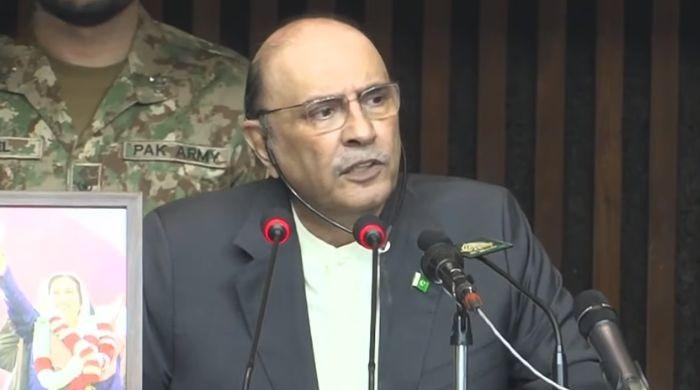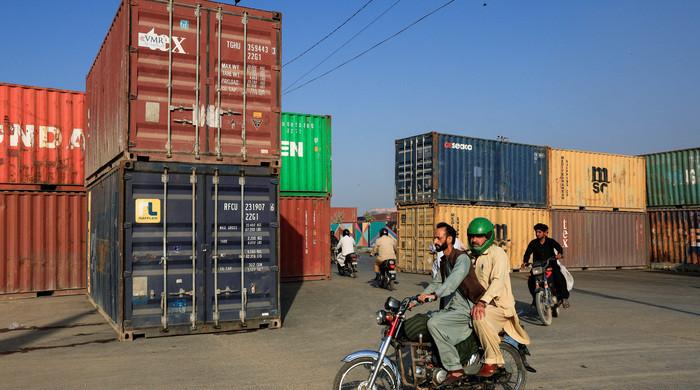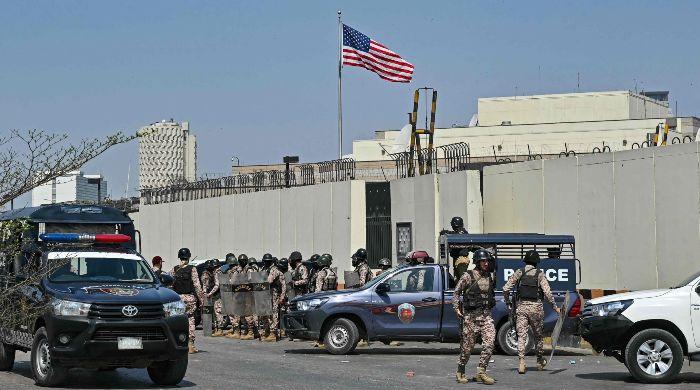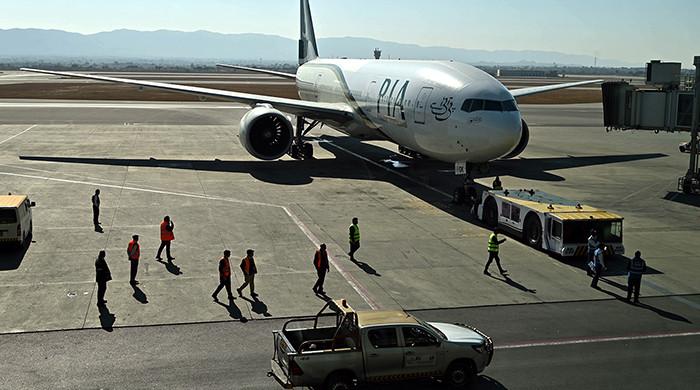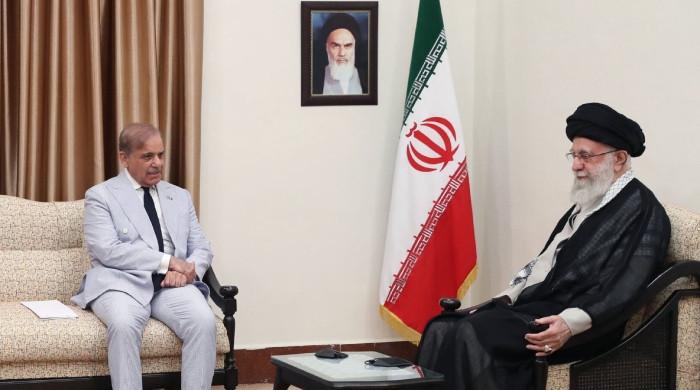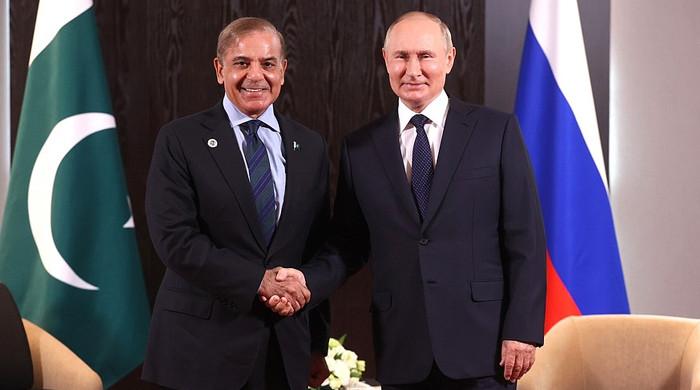Senate passes anti-terrorism bill amid opposition uproar
Bill allows preventive detention of suspects based on credible information or reasonable suspicion
August 19, 2025
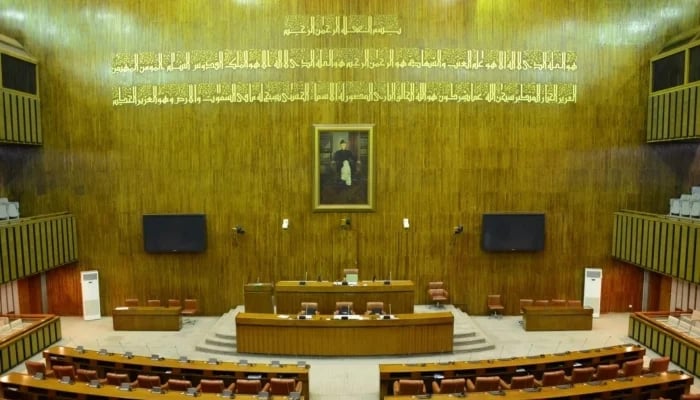
- House rejects JUI-F senator’s amendments.
- Clause allows detainee produced before judge.
- Sunset clause of three years included.
ISLAMABAD: Amid the opposition’s uproar, the Senate on Tuesday passed the Anti-terrorism (Amendment) Bill, 2025, with a majority of votes after rejecting amendments proposed by Kamran Murtaza, a lawmaker from the Jamiat Ulema-e-Islam-Fazl (JUI-F).
Minister of State for Interior and Narcotics Control Talal Chaudhry moved the bill further to amend the Anti-terrorism Act, 1997 [The Anti-terrorism (Amendment) Bill, 2025] in the House, which has already been approved by the National Assembly.
Murtaza moved certain amendments in the bill, but the House rejected them with a majority of votes. The house passed the bill through clause-by-clause reading.
The statement of objects and reasons of the bill says that the current security situation requires a robust response that goes beyond the existing legal framework.
The amendments aim to empower the government, armed forces, and civil armed forces with the necessary authority to detain individuals who pose a significant threat to national security.
This provision would allow for the preventive detention of suspects based on credible information or reasonable suspicion, thereby disrupting terrorist plots before they can be executed.
This will also provide Law Enforcement Agencies with the legal backing to conduct more effective operations against terrorism.
It would facilitate the use of Joint Interrogation Teams (JTIs), composed of members from various law enforcement and intelligence agencies, to conduct comprehensive inquiries and gather actionable intelligence.
Meanwhile, the Upper House of the Parliament also passed two more bills — including the Pakistan Land Port Authority Bill, 2025, and the Petroleum (Amendment) Bill, 2025 unanimously.
The Pakistan Land Port Authority Bill was moved by the state’s interior minister, while Minister for Petroleum Ali Pervaiz Malik presented the Petroleum (Amendment) Bill, 2025, in the House.
'We don’t want terrorists roaming freely'
Earlier, responding to various points raised by lawmakers in the Senate, Minister for Law and Justice Azam Nazeer Tarar said that currently, the country was facing the menace of terrorism, and amendments proposed by PPP’s Syed Naveed Qamar have already been incorporated to make it more effective.
The bill has also already passed judicial scrutiny tests, he said.
He said that a three-year sunset clause has also been added to it.
The amendment is in accordance with the original spirit of the 1973 Constitution, he added.
The minister said that under Clause 2 of the amendment, the detainee would have been presented before a judge within 24 hours.
Speaking on the occasion, PML-N’s Senator Irfan Siddiqui emphasised that no leniency should be shown toward terrorism.
“We do not want terrorists roaming freely while innocent people are slaughtered in different provinces, on passenger trains like the Jaffar Express, or in targeted attacks. These acts weaken our federation and create mistrust between the people and the state,” he observed.
Senator Siddiqui urged lawmakers to view anti-terrorism legislation in its proper spirit, as “we have lost nearly 100,000 lives to the menace of terrorism”.
“We must either surrender to militants or legislate to resist them. Such laws can prevent crime and also curb forced disappearances and arbitrary detentions,” he said.
The lawmaker also expressed his concern over political victimisation and the mistreatment of political leaders. Siddiqui recalled his own experience of arrest and imprisonment, saying he deeply empathised with fellow politicians who had been handcuffed or subjected to harsh treatment.
“When I saw Fawad Chaudhry with a cloth over his face, I stood in this House and said this should not happen. Today, when I see Shah Mehmood Qureshi in handcuffs, I feel the same grief,” he said.
He said he cannot support such treatment for anyone, even for those who once caused him pain.
PTI’s Barrister Syed Ali Zafar said that his party was also against the menace of terrorism and wanted to curb it. However, he said some of the bill’s clauses were against the law and the Constitution, so the bill should be referred to the committee.
PTI’s Noorul Haq Qadri suggested that the bill should be referred to the standing committee and Council of Islamic Ideology to take their input.
JUI-F’s Kamran Murtaza said that the bill should be referred to the standing committee for two to three days so it could be thoroughly discussed.
Amendments to petroleum law
According to the Petroleum (Amendment) Bill, 2025, the government will use information technology and real-time monitoring to digitally track petroleum products and oversee their reserves. The delivery of petroleum products to filling stations and storage facilities will also be tracked in real time.
The legislation introduces strict penalties for illegal activities. A fine of Rs1 million will be imposed for unlawfully importing, transporting, storing, refining, or blending petroleum. Repeat offences will attract a penalty of Rs5 million. In cases where petroleum products are stored or sold without a licence, deputy commissioners will take action, with machinery, materials, storage tanks, and the products themselves liable to seizure. In such cases, the owner may face a fine of up to Rs10 million.
The bill further provides that if a licence expires or is cancelled, a six-month grace period will be granted. The Explosives Department must renew licences within one month of receiving an application, and in case of delay, the concerned officer will be required to provide reasons. If a licence is not renewed, an appeal may be filed before the Secretary of the Petroleum Division.
For those found storing or selling smuggled petroleum products, their licensed storage facilities will be sealed. The bill also stipulates that all machinery, equipment, materials, and storage tanks used in the sale of smuggled fuel will be confiscated, with the offender facing a Rs100 million fine and cancellation of their licence. Any transport vehicles involved in the smuggling of petroleum will also be seized.
The legislation makes clear that affected parties will have the right to challenge such actions in court.
The statement of objects and reasons of the bill notes that IT-based tracking is being introduced to curb smuggling of petroleum products. It states that strict action will be taken against illegal transportation, refining, and unauthorised fuel stations, while deputy commissioners are being empowered with seizure authority to ensure effective enforcement.




